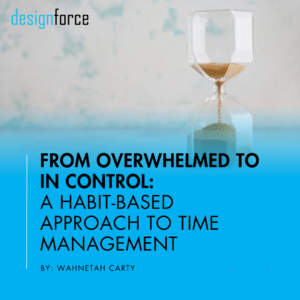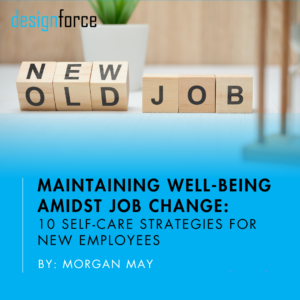By: A.J. Adriatico
In today’s fast-paced work environment, productivity is often celebrated as the go to measure for success. The more tasks you complete, the better, right? But what happens when the pursuit of productivity becomes overwhelming? When you feel compelled to fill every hour of your workday with tasks to keep you “busy”? This phenomenon is known as productivity guilt, and it can quickly spiral into toxic productivity, where the pressure to always be “on” comes at the expense of your physical and mental well-being.
Understanding Productivity Guilt
Productivity guilt arises when you set unrealistic expectations for yourself or your company. It can also stem from the constant comparison between your role, your peers, and your organization. That sensation of constant comparison is especially common in the AEC industry, where we work in teams and are often measured by KPIs such as billability and utilization rate. You may find yourself thinking, “If only I worked a little harder, I could be as successful as them,” or “I should be able to handle this workload.” These thoughts create a cycle of guilt and anxiety, leading to burnout and disengagement from your work.
Burnout is a serious consequence of productivity guilt. When you’re constantly pushing yourself without taking breaks or acknowledging your limits, you risk losing your passion and enthusiasm for your work. This disengagement not only affects your performance but also your overall well-being.
While productivity guilt can be challenging to overcome, there are some strategies to help you regain balance and find fulfillment in your work.
1. Identify the Root Cause of Your Guilt
The first step in overcoming productivity guilt is understanding why you feel this way. Are external expectations driving you to work harder? Is something in your personal life carrying over into your professional life, making you feel like you’re not doing enough? By identifying the source of your guilt, you can begin to address it directly.
2. Stop Comparing Yourself to Others
Comparison is often the thief of joy, and in the workplace, it can be very damaging. I think it’s important to understand that everyone’s path and pace differs, not only in their personal life but also at work. It’s easy to be frustrated when the outcome you’re hoping for doesn’t come as quickly as your peers. And it’s okay to feel frustrated! But what’s important is to remember to allow yourself to take a step back once those feelings of frustration kick in and reassess what you can do to improve.
3. Differentiate Between Being Busy and Being Productive
It’s easy to think that having a busy schedule means that we are being productive, but they are not the same. Being busy often means filling your time with tasks that may not necessarily contribute to your long-term goals. True productivity comes with working efficiently on tasks that move you closer to your goals. Learn to differentiate between the two and prioritize activities that have a meaningful impact.
4. Set Realistic Goals
Unrealistic goals are a common trigger for productivity guilt. When you set the bar too high, you’re setting yourself up for failure and disappointment. Instead, set achievable, realistic goals that challenge you but are within your reach. This approach allows you to celebrate small victories and build momentum toward larger achievements. For example, if you’re working towards licensure, rather than setting “become licensed” as your goal that constantly sits on your to-do list, break it down into some smaller, bite sized steps. For example, start with “sign up for a practice exam” or “build study schedule”.
5. Take Breaks and Practice Self-Care
It’s important to recognize that rest is not the enemy of productivity. Taking regular breaks and practicing self-care are crucial for maintaining your energy and preventing burnout. Schedule a time to relax and activities that will allow you to take a step back and recharge. A well-rested mind is far more productive than a fatigued one.
Conclusion
Changing your mindset and overcoming productivity guilt is a journey that requires time and patience. It’s important to acknowledge that there will be potential setbacks, and that’s okay. If you find yourself slipping back into old habits, don’t be too hard on yourself. Give yourself grace and keep trying. Over time, with consistent effort, you can find a healthier approach to productivity that aligns with your well-being and long-term success.
Productivity guilt is a common struggle in today’s work culture, but it doesn’t have to control your life. Truly understanding its causes and trying out strategies that can help you create a more balanced, fulfilling approach to work should be something that we prioritize. Remember, true productivity isn’t about how much you do, but how effectively you achieve your goals while maintaining your well-being. So, take a breath, give yourself permission to slow down, and allow yourself to have a healthier relationship with work and productivity.

Related Posts
Let's learn together.
Stay inspired and in the know on all things A|E|C.
Sign up for our monthly newsletter.










